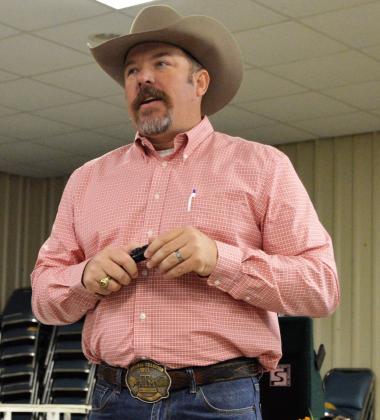The ag industry, consumer perception versus reality
Consumer perception of agricultural food products versus reality was the topic of speaker and board member Tim Akers at the Grimes County Farm Bureau annual meeting, Thursday, Oct. 17.
After dining on the customary ribeye steak dinner, Akers called for proactive efforts by ag producers to combat consumer perception when it comes to “fake milk,” “fake beef” and product labeling. The increase in production and promotion of products like almond milk, plant-based meat products and use of “non-GMO” or “hormone free” labeling has consumers believing those products have less environmental impact and that beef and crop production are harmful.
Akers said, “Here’s a fact, 73% of consumers believe that almond-based ingredients have the same protein as milk, but it doesn’t. Milk is 8% higher. We sit in the background knowing it’s better, but we’ve got to tell the consumers that.”
Yes, there may be an instructive nut milking video online, but Akers said, “All milks are not created equal. Only real milk has nine essential ingredients. There is no natural calcium in any other milk except dairy mammal milk.”
According to Akers, a representative for “Impossible Burger,” now available at Burger King, said, “Cows are not getting any better at making meat. We are. The steak has a huge symbolic value. If we can have an awesomely delicious world-class steak, then we’ll be very disruptive not only to the beef industry but to other sectors.”
According to Akers, this statement is false.
Akers said, “From 1975 to today, we make the same amount of beef with 30% fewer cows. That’s roughly 40 million cows but we’re still making the same amount of beef.”
Refuting proponents’ position that ranch land’s best use is for crop production and that the corn used to feed a steer will feed three infants, Akers said the higher protein “beef from a finished steer can feed 17.”
Akers also addressed his pet peeve, GMO versus non-GMO (Genetically modified organism) saying modification goes back thousands of years with the first crossbreeding of a product.
Akers said, “There are only 10 products that are GMO – corn, soybeans, cotton, canola, alfalfa, sugar beets, papaya, squash, potatoes and in 2017, apples.”
According to Akers, companies pay for the “Non-GMO Product Verified” label on their products and it has even been found on products not genetically modified. Akers research discovered five French’s products that bear the label - fried onions, jalapenos, two kinds of ketchup and yellow mustard – none of which have been genetically modified.
As for the safety factor, Akers said 900 studies over the course of 20 years have proven GMO products to be safe but added, “We’re not getting our consumers to believe the reality. They’re still believing the fake information.”
Another misperception driven by hormone labeling is about hormones in meat. While chicken and pork have naturally occurring hormones, it has been illegal since 1950 to add them. Only beef can have added hormones and is “tightly controlled.”
As for measuring hormones in beef, they are measured in nanograms which is “1 billionth of a gram and that equates to a blade of grass on a football field,” said Akers.
While steak from an implanted calf may have seven nanograms, beer has 15, cabbage has 2,000 and “meat” products from pinto beans, tofu and soy powder contain from 900,000 to 755 million nanograms.
Akers closed by saying, “It’s easier to fool someone than to convince them they’ve been fooled. The longer we wait to tell the truth, the longer it will take to convince them. The sooner we start telling the truth, the sooner we can correct this perception to reality.”
See related article, page 3.
TFB fighting for you
Board president Gary Moriarty recapped 2019 board activities and community involvement.
Board members attended the Texas Farm Bureau (TFB) convention, the TFB Summer Conference and met with state senators and representatives about legislation. An example of legislation passed supported by Farm Bureau relates to driving tractors on roads.
Moriarty said, “You could not drive a tractor on the shoulder. If you drove it on the shoulder and got hit, it was your fault because you were not in the lane of traffic. Now you can drive on the shoulder legally. If you get hit on a tractor on the shoulder, it’s not your fault.”
A Summer Conference topic was the use of drones in farming and ranching and illegal use by surveyors to survey property.
Moriarty said, “Farm Bureau is really fighting for you.”
According to Moriarty, Grimes County Farm Bureau (GCFB) spent $9,000 supporting youth fair participation, Ag Day, donations to eight volunteer fire departments, three county food banks and scholarships for four high school seniors.
Later in the program, board member Michael Walkoviak read letters from scholarship winners McKenna Holloway and Taylor Davis expressing their appreciation for the financial assistance and peace of mind the scholarships provided.
Board members reelected
Following approval of the minutes and treasurer’s reports, Jason Marek, Cole Price, Michael Walkoviak and Carol Garnett were reelected to the GCFM board of directors. After a drawing for door prizes, the meeting was adjourned.




